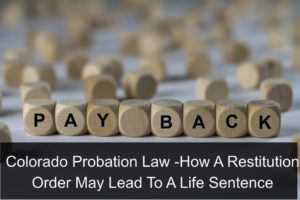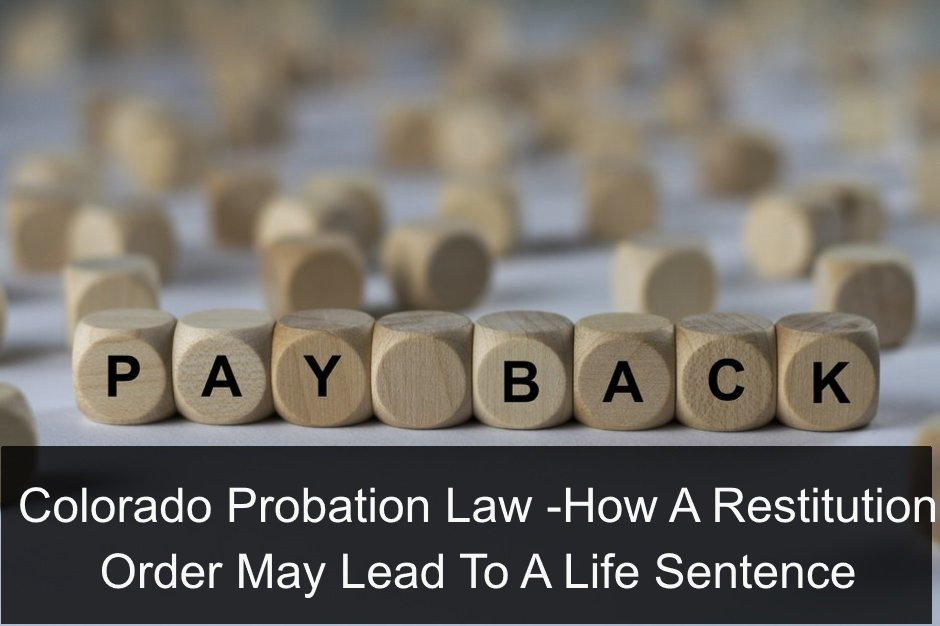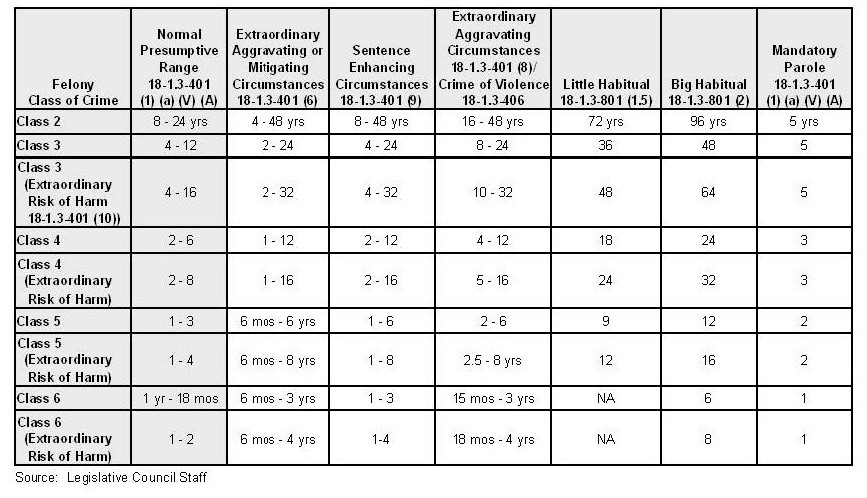




Colorado Probation Law – Restitution Order May Lead To A Life Sentence On Probation
By H. Michael Steinberg Colorado Probation Violation Lawyer – Attorney
 Colorado Probation Law – Restitution Order May Lead To A Life Sentence On Probation – A new Colorado case makes clear that, where the Defendant is ordered to pay a very large amount of restitution, the sentencing Judge has the authority to sentence the Defendant to an indeterminate sentence – essentially a life sentence on probation tp pay the money back.
Colorado Probation Law – Restitution Order May Lead To A Life Sentence On Probation – A new Colorado case makes clear that, where the Defendant is ordered to pay a very large amount of restitution, the sentencing Judge has the authority to sentence the Defendant to an indeterminate sentence – essentially a life sentence on probation tp pay the money back.
The authority of Colorado Judges to impose such a lengthy sentence was recently (2018) challenged and re-affirmed in the Colorado case of People v. Trujillo – 2018COA12.
Two Different Kinds Of Sentences – Determinate And Indeterminate
When a Defendant in a Colorado criminal case is sentenced to jail or prison in all cases with the exception of sex crime cases, that sentence is “determinate” – it is specific – for example a four year prison sentence for felony theft.
The law that governs a sentence to prison is 18-1.3-408 – Here is a reprint of the law:
§ 18-1.3-408. Determinate Sentence of Imprisonment Imposed by Court
When a person has been convicted of a felony and a sentence of imprisonment imposed, the court imposing the sentence shall fix a definite term of imprisonment, which shall be not longer than the terms authorized in section 18-1.3-401; except that, for persons convicted on or after November 1, 1998, of a sex offense, as defined in section 18-1.3-1003 (5), the court shall impose an indeterminate sentence as provided in part 10 of this article.
Here is a chart showing the sentences available to Colorado Judges when they impose prison in felony cases:
Probation Sentences Have No Such Limitations
The “determinate sentencing structure” found in sections 18-1.3-408, C.R.S. 2012, does not apply to sentences to probation.
An Indeterminate Sentence of “Ten To Life” In The Trujillo Case – Upheld
In the Trujillo case, the Defendant was ordered to pay back over $170,000.00 in restitution. When he was placed on probation the Trial Judge imposed what he termed an “indefinite probation sentence” because of the substantial restitution that Trujillo was ordered to pay.
In imposing an indeterminate probation sentence, the trial court stated,
“There is case law that talks about whether [indeterminate probation] is something that can or should be imposed and it’s certainly something that is allowed regardless of the type of conviction that has been entered.”
The Judge ordered a term of probation of seven years to life.
The Law That Allows For Indeterminate Sentencing In Cases Where Probation Is Granted
Under section 18-1.3-202(1)(a), C.R.S., a Trial Court:
“may grant the defendant probation for such period and upon such terms and conditions as it deems best.”
and further….
“[t]he length of probation shall be subject to the discretion of the court and may exceed the maximum period of incarceration authorized for the classification of the offense of which the defendant is convicted.”
A Brief History Of The Maximum Length Of Colorado Probation Sentences
Between approximately 1935 and 1971, Colorado courts had the legal authority to sentence Defendants convicted of felonies to probationary terms of up to five years. Then in 1972 that five-year limit was removed but the maximum sentence to probation was less than clear.
In 2003, the Colorado State Legislature made clear that a Colorado Judge had the discretion to place a Defendant convicted of a felony on probation for a term that exceeded the maximum period of time authorized for the particular offense.
By enacting 18-1.3-202(1)(a), C.R.S. the legislature subsection deliberately chose not to impose an express limitation on the permissible length of probation.
Parsing The Colorado Probation Sentencing Law – 18-1.3-202
Here is the relevant law Section 18-1.3-202(1)(a), C.R.S.
§ 18-1.3-202. Probationary Power Of The Court
(1) When it appears to the satisfaction of the court that the ends of justice and the best interest of the public, as well as the defendant, will be served thereby, the court may grant the defendant probation for such period and upon such terms and conditions as it deems best.
The length of probation shall be subject to the discretion of the court and may exceed the maximum period of incarceration authorized for the classification of the offense of which the defendant is convicted but shall not exceed five years for any misdemeanor or petty offense.
If the court chooses to grant the defendant probation, the order placing the defendant on probation shall take effect upon entry and, if any appeal is brought, shall remain in effect pending review by an appellate court unless the court grants a stay of probation pursuant to section 16-4-201, C.R.S.
Unless an appeal is filed that raises a claim that probation was granted contrary to the provisions of this title, the trial court shall retain jurisdiction of the case for the purpose of adjudicating complaints filed against the defendant that allege a violation of the terms and conditions of probation.
In addition to imposing other conditions, the court has the power to commit the defendant to any jail operated by the county or city and county in which the offense was committed during such time or for such intervals within the period of probation as the court determines.
The aggregate length of any such commitment whether continuous or at designated intervals shall not exceed ninety days for a felony, sixty days for a misdemeanor, or ten days for a petty offense unless it is a part of a work release program pursuant to section 18-1.3-207. That the defendant submit to commitment imposed under this section shall be deemed a condition of probation.
(2) The probation department in each judicial district may enter into agreements with any state agency or other public agency, any corporation, and any private agency or person to provide supervision or other services for defendants placed on probation by the court. The agreements shall not include management of any intensive supervision probation programs created pursuant to section 18-1.3-208
The Reasoning Underlying Extraordinarily Long Periods Of Probation In Colorado
The reasoning underlying such lengthy sentences to probation – probation terms that exceed the maximum presumptive term of incarceration authorized by law- is that incarceration is considered primarily punitive while a sentence to probation is primarily rehabilitative. Because probation focuses on rehabilitation, an indeterminate probationary term “may be necessary in certain instances to achieve rehabilitative goals for certain offenders.”
From the Trujillo Case:
There is no reason to believe that the legislature’s judgment concerning an appropriate term of punishment by imprisonment was intended to fix, or is even related to, the term of probation that may be required to rehabilitate the offender.
There may be many cases in which the goals of probation simply cannot be achieved within the time constraints the legislature has placed on imprisonment.
Does Probation For Life Ever Come To An End? – Terminating Lifetime Probation Early
Here is the good news, a Court retains discretion to determine when an offender who has been sentenced to an indeterminate term can be terminated from probation.
Subject to specific procedural steps, a court may:
….for good cause shown and after notice to the defendant, the district attorney, and the probation officer, and after a hearing if the defendant or the district attorney requests it, … reduce or increase the term of probation. § 18-1.3-204(4)(a), C.R.S.
Thus, the court makes the decision when to terminate an offender’s probation, and does so by issuing an order to that effect.
Colorado Probation Law – Restitution Order May Lead To A Life Sentence On Probation
If you found any of the information I have provided on this web page article helpful please click my Plus+1 or the Share buttons for Twitter and Facebook below so that others may also find it.
The contents of this article are based upon my research, my personal experience and my personal analysis and opinions developed from my thirty six years (as of 2017) of criminal trial experience from both sides of the courtroom – as a former career prosecutor for Arapahoe and Douglas Counties (13 years) and as the owner of my own Criminal Defense Law Firm since 1999 (18 years).
The reader is also admonished that Colorado criminal law, like criminal law in every state and at the Federal level, changes constantly. The article appearing above was accurate at the time it was drafted but it cannot account for changes occurring after it was uploaded.
If, after reading this article, you have questions about your case and would like to consider retaining our law firm, we invite you to contact us at the Steinberg Colorado Criminal Defense Law Firm – 303-627-7777.
Never stop fighting – never stop believing in yourself and your right to due process of law. You will not be alone in court, H. Michael will be at your side every step of the way – advocating for justice and the best possible result in your case. H. Michael Steinberg is passionate about criminal defense. His extensive knowledge and experience of Colorado Criminal Law gives him the edge you need to properly handle your case
 ABOUT THE AUTHOR: H. Michael Steinberg – Email The Author at:
ABOUT THE AUTHOR: H. Michael Steinberg – Email The Author at:
A Denver Colorado Criminal Defense Lawyer – or call his office at 303-627-7777 during business hours – or call his cell if you cannot wait and need his immediate assistance – please call 720-220-2277.
“A good criminal defense lawyer is someone who devotes themselves to their client’s case from beginning to end, always realizing that this case is the most important thing in that client’s life.”
You should be careful to make a responsible choice in selecting a Colorado Criminal Defense Lawyer. We encourage you to “vet” our firm. Over the last 36 plus years – by focusing ONLY on Colorado criminal law – H. Michael has had the necessary time to commit to the task of constantly updating himself on nearly every area of criminal law, to include Colorado criminal law and procedure and trial and courtroom practice.
Putting more than 36 years of Colorado criminal defense experience to work for you.
H. Michael works hard to get his clients the best possible results in and out of the courtroom. He has written, and continues to write, extensively on Colorado criminal law and he hopes this article helps you in some small way – Colorado Probation Law – Restitution Order May Lead To A Life Sentence On Probation.

Other Articles of Interest:
- Colorado Probation Violations Based On The Use Of Medical Marijuana
- Colorado Criminal Law – Can You Use Medical Marijuana While On Probation in Colorado – Update – A New 2015 Law Says YES With Conditions
- Colorado Probation Violation Law – Impact Of A Suspended Sentence
- Non-Payment Of Restitution As A Basis For Probation Violation Under Colorado Law
- Colorado Probation Revocations – Why Working With Your Probation Officer Makes Sense













